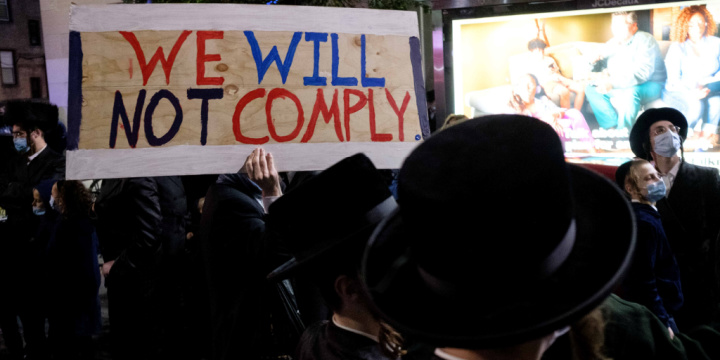New York City Set to Impose New COVID-19 Closures Despite Orthodox Jewish Protests
 by Reuters and Algemeiner Staff
by Reuters and Algemeiner Staff

Ultra-Orthodox Jews gather in the Borough Park neighborhood of Brooklyn, in New york City, to protest against coronavirus disease (COVID-19) restrictions, Oct. 7, 2020. Photo: Reuters / Yuki Iwamura.
New York City will begin enforcing new shutdown rules on businesses and schools in coronavirus hot spots on Thursday that have already triggered angry protests from a small contingent of Orthodox Jews in one of the affected areas.
Mayor Bill de Blasio first announced his plan to tamp down outbreaks in parts of Brooklyn and Queens on Sunday after the rate of positive coronavirus tests in some neighborhoods exceeded 3 percent for seven straight days.
The data has worried health officials who fear a second wave in a city that endured what at one point in the spring was the world’s most rampant outbreak of COVID-19. Citywide the latest positive rate stood at 1.39 percent on Wednesday.
De Blasio’s decision to delineate the neighborhoods where closures would be enforced using postal ZIP codes drew scorn from New York Governor Andrew Cuomo, a fellow Democrat with whom he has often feuded. New York is one of about 30 out of 50 US states were cases have risen over the past two weeks, according to a Reuters analysis.
By Tuesday, Cuomo, who has ultimate authority over shutdown measures, had released new color-coded maps that created confusion in part with their diagonal lines bisecting city blocks, leaving it unclear which non-essential businesses on many streets would have to close.
De Blasio promised to bring clarity before enforcement began on Thursday morning and lasted at least 14 days.
“We’re working with the state to get very clear the exact boundaries,” he told reporters. “I thought that the ZIP codes were clearer.”
In some predominantly Hasidic Jewish areas of Brooklyn’s Borough Park, which will face the most stringent closures and where religious gatherings must not exceed 10 people, hundreds of protesters gathered on Tuesday night to assail restrictions coming into effect during Jewish religious holidays. In that area, more than 8 percent of coronavirus tests have come back positive this week.
After midnight, hundreds of Hasidic men, mostly unmasked, gathered round a bonfire of burning face masks in the middle of an avenue, according to videos circulated online and local media. Some protesters can be seen in videos badly beating at least one Orthodox Jewish man they perceived to be a “snitch,” and heckled and chased away local law enforcement officials and journalists.
Four state and city elected officials representing Orthodox Jewish communities released a letter that castigated Cuomo, a Catholic, for what they described as singling out a religious community with insufficient consultation.
“Even worse, his rhetoric in recent days has been irresponsible and pejorative, particularly to a community of Holocaust survivors and their descendants, for whom his language was reminiscent of past verbal attacks on Jewish communities,” the letter said. It was signed by New York state Senator Simcha Felder, Assemblyman Simcha Eichenstein and city council members Chaim Deutsch and Kalman Yeger.
On Wednesday, Cuomo defended the restrictions, which will also be enforced outside the city in Rockland and Orange counties, also home to large Orthodox Jewish communities.
“To the extent there are communities that are upset, that’s because they hadn’t been following the original rules,” he told reporters. “And that’s why the infection spread.”
The backlash has spread beyond Hasidic Jewish residents. The bishop of the Roman Catholic diocese of Brooklyn, Nicholas DiMarzio, issued a statement on Tuesday opposing the new rules, saying they had successfully been adhering to the prior ones.
The New York Police Department did not respond to questions about the overnight protests and violence.
De Blasio said the protesters did not represent the majority of New Yorkers and called for unity, calling on New Yorkers to stand up to “coronavirus denialists.”
 Iranian, 2 Others Detained in Peru Over Plot to Kill Israelis
Iranian, 2 Others Detained in Peru Over Plot to Kill Israelis Iran Sentences Rapper Toomaj Salehi to Death Over 2022-23 Unrest
Iran Sentences Rapper Toomaj Salehi to Death Over 2022-23 Unrest Netanyahu: ‘Antisemitic Mobs Have Taken Over Leading U.S. Universities’
Netanyahu: ‘Antisemitic Mobs Have Taken Over Leading U.S. Universities’ U.S. Decides Against Sanctions on IDF’s Netzah Yehuda Battalion
U.S. Decides Against Sanctions on IDF’s Netzah Yehuda Battalion Israel Says It Is Poised to Move on Rafah
Israel Says It Is Poised to Move on Rafah Israeli Hostage Hersh Goldberg-Polin Seen Alive in a New Hamas Video
Israeli Hostage Hersh Goldberg-Polin Seen Alive in a New Hamas Video Palestinian Prime Minister Announces New Reform Package
Palestinian Prime Minister Announces New Reform Package France: Man Suspected of Abducting, Raping Jewish Woman ‘to Avenge Palestine’
France: Man Suspected of Abducting, Raping Jewish Woman ‘to Avenge Palestine’ Israel Intensifies Strikes Across Gaza, Orders New Evacuations in North
Israel Intensifies Strikes Across Gaza, Orders New Evacuations in North Iran Threatens to Annihilate Israel Should It Launch a Major Attack
Iran Threatens to Annihilate Israel Should It Launch a Major Attack



 Israel Says It Is Poised to Move on Rafah
Israel Says It Is Poised to Move on Rafah U.S. Decides Against Sanctions on IDF’s Netzah Yehuda Battalion
U.S. Decides Against Sanctions on IDF’s Netzah Yehuda Battalion Netanyahu: ‘Antisemitic Mobs Have Taken Over Leading U.S. Universities’
Netanyahu: ‘Antisemitic Mobs Have Taken Over Leading U.S. Universities’ Iran Sentences Rapper Toomaj Salehi to Death Over 2022-23 Unrest
Iran Sentences Rapper Toomaj Salehi to Death Over 2022-23 Unrest Iranian, 2 Others Detained in Peru Over Plot to Kill Israelis
Iranian, 2 Others Detained in Peru Over Plot to Kill Israelis